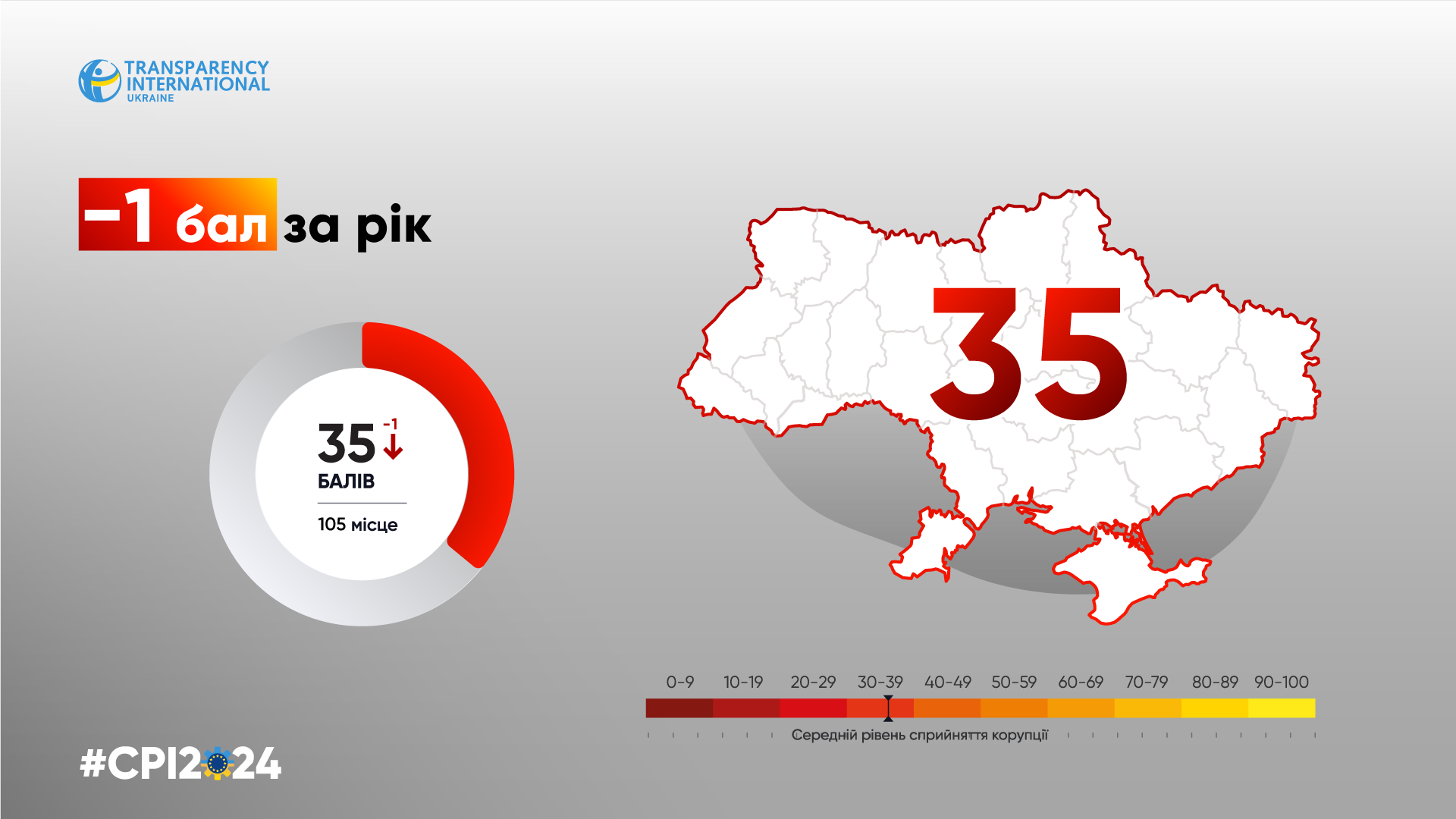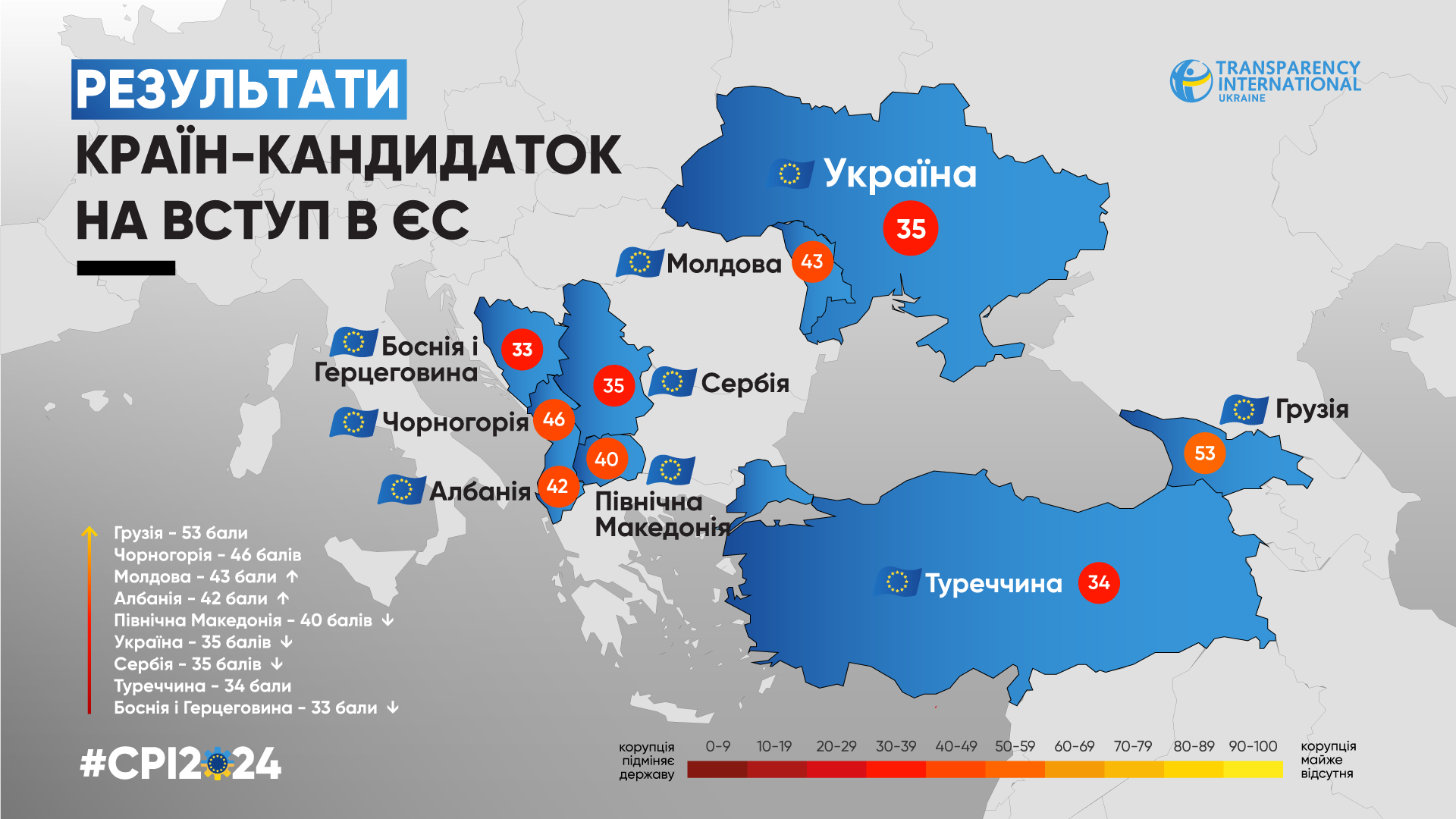Minus A Point For Reform Quality. Making Sense of Ukraine’s Slippage in Corruption Perceptions Index 2024

35 points out of 100 and 105th place among 180 countries. This is Ukraine’s result in the 2024 Corruption Perceptions Index (CPI). Putting things into perspective, we have lost one point in the Transparency International study over the last year.
Let’s take a closer look at what caused this decline, how and who evaluated us and how we can get out of this stagnation.
How the Index works and what our score indicates
In the latest study, Ukraine was ranked below the global average score in 2024 (43 points), which means that our country is perceived as more corrupt.
However, Ukraine’s slippage is aligned with general trends in the perception of corruption in our region. Moreover, by the CPI standards, minus one point is a change within the margin of error, which, however, indicates a certain stagnation and a rather formal approach to implementing reforms. But what does it mean to be within the margin of error?
The CPI is a rather extensive study, which causes some remoteness of the events covered by the Index. The reason is that the amount of data collected and processed about a country is too large and takes a lot of time to work on. The CPI is based on 13 studies by various reputable institutions, with each report covering a different period. But the combination of these different assessments ultimately yields a balanced result, even though each source focuses on slightly different aspects and evaluates a different number of countries.
For example, this time Ukraine was assessed by eight out of 13 studies. Importantly, half of them covered only the events of 2023. Other studies focused on the period up to September 2024. Because of this, many of the events that took place in 2024 will be more reflected in the next Index.
In addition, Transparency International has now adjusted the conversion of the original research indicators to the 100-point CPI scale, which also affected the final results of the countries.
Throughout the previous year, scandals around top officials regularly erupted: journalists from Bihus.Info not only found employees of the Security Service of Ukraine who organized surveillance of them, but also told about leaks in the National Anti-Corruption Bureau (NABU), a scandal around alleged corruption in the reconstruction of Hostomel city was spread in international media, and new reports about bribes in the Medical and Social Expert Commission (which diagnoses disability) appeared almost every day. But it is precisely because this year’s Index covered only a portion of these events that Ukraine’s decline was so insignificant.
The difference between the Index score and events on the ground is a common phenomenon. For example, in Serbia, which also lost one point, numerous national protests against corruption in the government have been going on since November last year amid growing influence of the local president and imbalance of power. Another example is Georgia, whose score has not changed, although street protests against the election results began in October, and the government has ties to kleptocratic networks and has decided to suspend European integration altogether.
What was Ukraine criticized and praised for?
Despite the changes within the margin of error, we are beginning to see a systemic negative trend in the survey results. In the opinion of experts, Ukraine has lost ground in five out of eight studies, namely:
- Country Risk ranking by The Economist(18 points), which focuses on budget transparency, misuse of funds, bribery and public sector appointments;
- S&P Global Insights country risk assessment (32 points), which highlights the risks of bribery in imports/exports, government contracts and doing business;
- the PRS Group’s International Country Risk Guide (33 points), which focuses on nepotism and patronage, suspicious links between politics and business, exchange of services, and secret financing of political parties;
- expert survey of the Corruption Index of the Varieties of Democracy project(33 points), which focuses on corruption in the executive, judicial and legislative branches of government;
- the World Economic Forum’s Executive Opinion Survey (40 points), which focuses on the distribution of public funds and bribery.
So, to summarize, in many cases, our country has fared worse in studies focused on political corruption. From this perspective, procurement scandals in the defense and energy sectors, the story of the NABU data leak, the appointment of Olena Duma as head of ARMA despite warnings from the civil society and other similar unpleasant stories in recent years could have had a negative impact. In addition, as we have already noted, it was during the last two years that new cases of government pressure on journalists and activists were recorded.
At the same time, three other studies helped to level out Ukraine’s score a bit. In particular, our position slightly increased in the following:
- Nations in Transit report by Freedom Househuman rights defenders (37 points), which assesses bureaucracy, whistleblower protection and the implementation of anti-corruption legislation;
- Bertelsmann Transformation Index (51 points), which focuses on corruption prevention, media and prosecution of corrupt officials;
- The World Justice Project’s Rule of Law Index (34 points), which assesses the use of official positions for private gain.
In the latest study, where we scored one point, the judiciary has undergone the most positive changes. Obviously, this was the result of the detention of former Supreme Court Chief Justice Vsevolod Kniaziev in May 2023, the relaunching of the HCJ in January 2023 and the HQCJ in June 2023, the start of the competition to the Constitutional Court, etc.
The Bertelsmann Foundation, which added two points to Ukraine’s score, praised the digitalization processes that narrow the space for corruption and the partial de-oligarchization of the country, which has led to a weakening of the influence of big business. Experts also noted the intensification of anti-corruption investigations by the NABU and the Specialized Anti-Corruption Prosecutor’s Office (SAPO), which have opened a number of cases against former MPs, the former Minister of Agriculture, the former head of the State Property Fund (SPFU), the State Judicial Administration and other top officials over the past two years.
However, the report does not mention the equality of officials before the law due to the general corruption of the law enforcement and judicial systems. The researchers note that the fight against corruption has given way to winning the war as a priority, and that limited access to public data creates corruption risks.
The report by Freedom House experts highlights the success of anti-corruption institutions in exposing and legally assessing corruption in defense procurement (defense procurement legislation was also updated in early 2023). In addition, human rights activists noted the return of mandatory electronic declarations for officials and the postponement of the launch of the oligarch registry after comments received from the Venice Commission. At the same time, Freedom House warns against sabotage by certain corrupt officials of the State Anti-Corruption Program adopted in March 2023.
Where to look for ways for Ukraine’s growth in the CPI?
The fact that our successes achieved in fighting corruption are mostly related to the fulfillment of international obligations and recommendations of the European Commission once again confirms that our country’s European integration is inextricably linked to the fight against corruption.
Ukraine needs to develop ambitious and comprehensive roadmaps for joining the European Union. This year, the first and most difficult cluster in the negotiations with the EU may open, the Fundamentals cluster, which includes negotiating chapter 23, Justice and Fundamental Rights. This very chapter encompasses the fight against corruption. However, in our case, the anti-corruption component will be included in every cluster of negotiations with the EU: from agriculture, environment and social affairs to customs, transport and energy.
Therefore, the recently developed screening report, as well as the European Commission’s reports on enlargement, which contain many European integration requirements, should serve as sources of advice for improving the situation with corruption. They should be the key to Ukraine’s leap forward in the Index.
In addition, a number of reforms are contained in other documents. A case in point is the Ukraine Facility Plan roadmap for recovery, for which we receive financial assistance from the EU. It is also worth mentioning the measures specified in the IMF Program under the Extended Fund Facility (EFF). Implementation of these recommendations helps ensure Ukraine’s financial and macroeconomic stability and continues to play an important role for us.
But most importantly, the government should view the fulfillment of all these requirements as a marathon to strengthen Ukraine, not a short-distance sprint for money, no matter how important it may be to patch holes in the budget. Formal reforms based on the tick-box approach does not produce strategic results, so we have to play the long game.
Then Ukraine may be able to demonstrate an effective fight against corruption so that we can truly become a member of the European Union by 2029, as predicted by the EU Commissioner for Enlargement.
Please select it with the mouse and press Ctrl+Enter or Submit a bug














 Login with Google
Login with Google